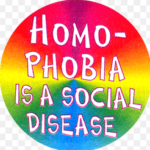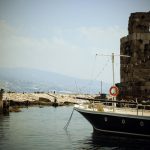A Monumental Place
I have been journeying around the world for as long as I’ve been out as a gay man–about thirty years–and in all the latitudes and longitudes there is no place like Amsterdam, Holland.
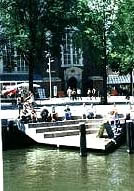 I’m not talking about sex, drugs or rock ‘n roll as I think about this canal-carved city by the chilly North Sea. No, there is something far more important about this place which every lesbigay visitor should take time to contemplate.
I’m not talking about sex, drugs or rock ‘n roll as I think about this canal-carved city by the chilly North Sea. No, there is something far more important about this place which every lesbigay visitor should take time to contemplate.
As our community in Asia suffocates in closets, is scorned in Africa, is stoned by Muslim fundamentalist in Arabia, bashed by rigid Christians in America, there exists in Holland a small but beautiful place of healing.
It’s a carved monument which unconditionally affirms the dignity of homosexual men and women everywhere.
The Homomonument is made of polished gray granite in the shape of a large triangle lying flat on the pavement by the Keizersgracht canal in front of the beautiful 17th century Westerkerk (West Church). It is at once our Arc d’Triumphe and our Vietnam Memorial.
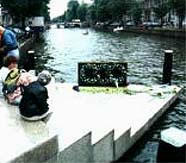 Standing in the center of the triangle I felt a stirred sentience, a connectedness with both our hope-filled future and our poignant past–our ecstasy and our agony. There is nothing like this monument anywhere–although there are other smaller gay memorials around the world (http://andrejkoymasky.com/mem/holocaust/ho08.html )
Standing in the center of the triangle I felt a stirred sentience, a connectedness with both our hope-filled future and our poignant past–our ecstasy and our agony. There is nothing like this monument anywhere–although there are other smaller gay memorials around the world (http://andrejkoymasky.com/mem/holocaust/ho08.html )
Amsterdam’s Homomonument is not off in some remote corner of the city but proudly present in front of West Church, about a hundred yards from another famous memorial, the Anne Frank House.
Jutting out into a canal, the stepped-down triangle was designed by Karin Daan in dedicated in 1987 with these inscribed words: “Endlessly Seeking Friendship”.
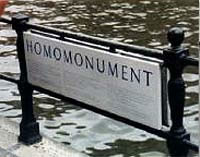 There is also a plaque that reads: “Commemorates all women and men ever oppressed and persecuted because of their homosexuality. Supports the international lesbian and gay movement in their struggle against contempt, discrimination and oppression. Demonstrates that we are not alone. Calls for permanent vigilance. Past, present and future are represented by the three triangles on this square”.
There is also a plaque that reads: “Commemorates all women and men ever oppressed and persecuted because of their homosexuality. Supports the international lesbian and gay movement in their struggle against contempt, discrimination and oppression. Demonstrates that we are not alone. Calls for permanent vigilance. Past, present and future are represented by the three triangles on this square”.
History of Decency
I wondered how it got here. How is it that this particular city on the north coast of European civilization opened its mind, pockets and society to accept such a controversial memorial when so much of the world stands in denial or opposition to the nature of homosexuality.
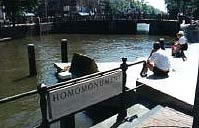 I asked a Dutch-American friend what accounts for Holland’s high level of tolerance for lesbigay people. He described a political history that for hundreds of years has been competitive yet inclusive of diverse forces with no one group despotically subjecting the others to fierce religious or secular domination. Although there have been periods of conservatism, the balance has always been regained.
I asked a Dutch-American friend what accounts for Holland’s high level of tolerance for lesbigay people. He described a political history that for hundreds of years has been competitive yet inclusive of diverse forces with no one group despotically subjecting the others to fierce religious or secular domination. Although there have been periods of conservatism, the balance has always been regained.
The milieu for such compassion and courage has emerged over the course of several centuries. Holland’s liberal attitude did not spring from a vacuum or aberration of climate. Since the rise of the great mercantile cities of Brugge, Antwerp (site of the 2013 OutGames) and Amsterdam (site of the 1998 Gay Games) beginning in the 15th century, coinciding with the upheaval of the religious reformation, the old northern Hanseatic world of commerce molded a political trend of decency.
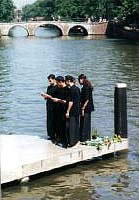 It valued the rule of law, disseminating a degree of fairness to all citizens, although unevenly, over the course of five hundred years.
It valued the rule of law, disseminating a degree of fairness to all citizens, although unevenly, over the course of five hundred years.
Leaders came to understand the importance and value of independent merchants entering contractual agreements in pursuit of commerce and profit. Stable and reasonable politics, in turn, provided a lawful system of accounts, traffic and banking which assured continuous prosperity and general citizen satisfaction.
Human worth, honor, respect and lawful behavior became grounded in political tolerance, fairness and democratically elected representation free of the tyranny of kings, bishops and petty warlords.
As a result of these traditions here in Holland, and Scandinavia, society has fomented an atmosphere of fairness and respect for the common good.
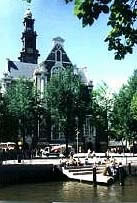 Such attitudes continue today, manifesting in the particular laws regarding homosexuality that:
Such attitudes continue today, manifesting in the particular laws regarding homosexuality that:
(1) recognize the inborn nature of sexual orientation
(2) permit all citizens be free from discrimination
(3) allow for unhindered access to social, political, spiritual and artistic expression and
(4) acknowledge the validity of same-gender love and relationships (same-sex marriage has been legal since April 2001)
So today Holland lives free and fair in the legacy of its history; it celebrates with its artful monuments these benign and just virtues of civilization. It is a city where society, always imperfect, nevertheless has achieved a high point of humanistic evolution.
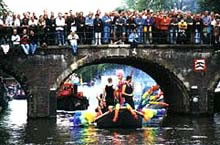 The Gay Games were held in Amsterdam in 1998 using a simple and powerful theme which is not just a word here, but a way of life: ‘Friendship’. Simultaneous with the Games was the unusual Gay Pride parade held along the main canal (photo left) the only Parade to float on water.
The Gay Games were held in Amsterdam in 1998 using a simple and powerful theme which is not just a word here, but a way of life: ‘Friendship’. Simultaneous with the Games was the unusual Gay Pride parade held along the main canal (photo left) the only Parade to float on water.
Also see:
Gay Holland News & Reports 2001 to present
Gay Holland Photo Galleries



